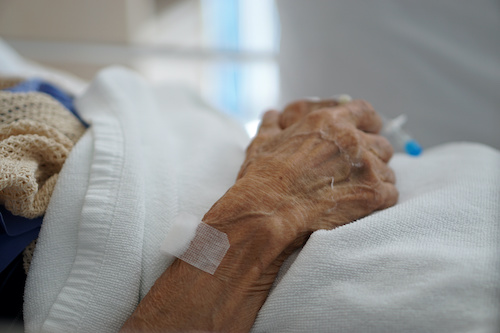
New Brunswick, N.J. - December 5, 2020 – Primary central nervous system lymphoma (PCNSL) is a type of cancer that develops in the brain and or spinal cord. Older individuals are at an increased risk of developing this type of cancer, and treatment for these patients tends to be challenging due to the prevalence of comorbidities, frailty, and challenges with delivery of treatment. In a retrospective study of patients with newly diagnosed PCNSL, researchers at Rutgers Cancer Institute of New Jersey and colleagues used geriatric assessments to analyze detailed characteristics, treatment, and outcomes in patients across 17 academic centers.
Results of the work are being presented at the virtual American Society of Hematology Annual Meeting by lead and presenting author Kevin David, MD, hematologist/oncologist at Rutgers Cancer Institute along with senior author Andrew M. Evens, DO, MSc, FACP, associate director for clinical services and director of the Lymphoma Program at Rutgers Cancer Institute and medical director of oncology services at RWJBarnabas Health. Both are faculty members at Rutgers Robert Wood Johnson Medical School and share more about the work:
Q: Why is this topic important to explore?
A: The incidence of PCNSL is increasing in the United States, driven in large part by an increase among older patients. Many of the studies regarding treatments of this disease have mainly focused on younger patients, and we therefore do not know the best strategy to treat older patients. We know that methotrexate is an important drug to treat PCNSL, but we don’t know the best dose to use in older patients and whether it is best to combine methotrexate with other drugs. These drugs can have significant side effects in older patients, so it is important to balance the beneficial effects of treatment with the risk of toxicities when picking a treatment strategy.
Q: Tell us about the work and what you and your colleagues found.
A: We collected retrospective data on around 450 patients older than age 60 with PCNSL treated at 17 different institutions in the U.S. We gathered information on patient characteristics, treatments, and outcomes. Performing a geriatric assessment, which aims to comprehensively characterize a patient’s medical conditions and ability to do routine daily activities, may help oncologists figure out how strong patients are. Our analysis showed that these assessments are also associated with how well patients do with PCNSL treatment. While we have known that methotrexate is important to treat this disease in older patients, our study showed that patients who received the monoclonal antibody rituximab as part of their methotrexate-containing treatment had improved results. Additionally, among the most common methotrexate and rituximab-based combination regimens that are in use, the three-drug regimen known as MTR (methotrexate, temozolomide, rituximab) seemed associated with the best results.
Q: Why are these results significant?
A: We have shown that a geriatric assessment should be an important part of treating older patients with PCNSL. Additionally, future clinical trials are needed focusing specifically on this patient population, and geriatric assessments should be used in designing treatments, so that side effects can be minimized. While the MTR regimen appeared to produce the best results compared to other regimens, this study was a retrospective analysis and further prospective trials in older patients are needed to confirm this. The MTR regimen may be the best, however, on which to base future chemotherapy combinations given the results of our analysis.
Author disclosures and other details can be found here.
###
For journalists – contact:
Krista Didzbalis
Media Relations Assistant
908-812-6114
krista.didzbalis@rutgers.edu
For patient appointments/inquiries – contact:
844-CANCERNJ (844-226-2376)

